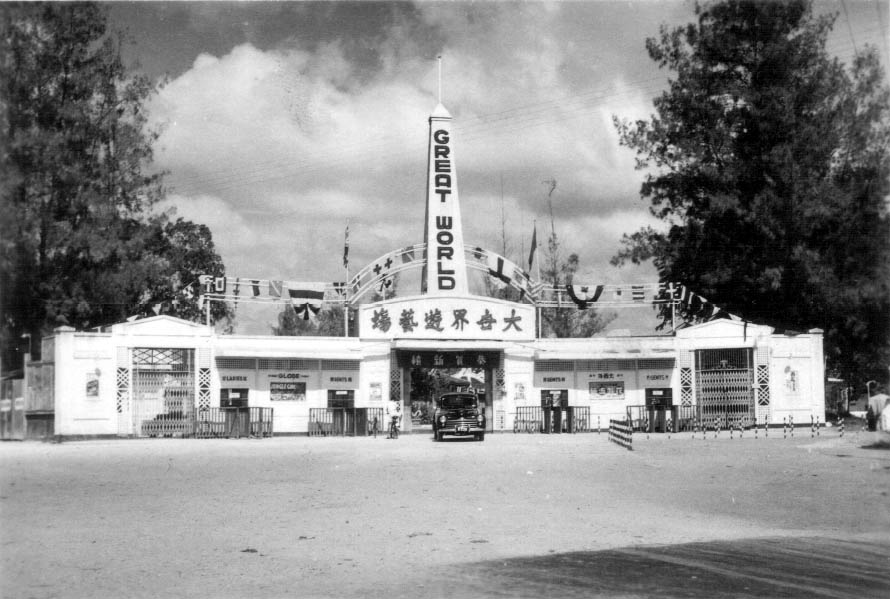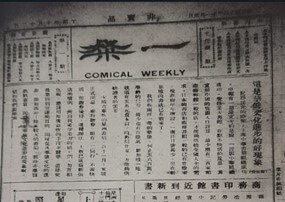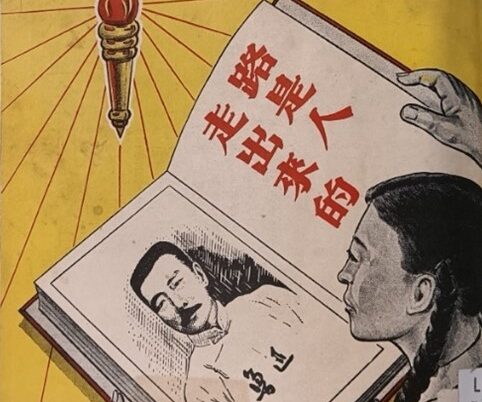Local Chinese television programmes (1963–1980)
Singapore’s two earliest television channels, Channel 5 and Channel 8, started broadcasting on a regular basis in April and November 1963 respectively. They ran programmes in the four official languages: Malay (20%), Chinese (including dialects) (35%), English (35%), and Tamil (10%).1 In 1973, Channel 5 started to broadcast programmes in English and Malay, while Channel 8 carried programmes in Chinese and Tamil. The programmes in different languages scheduled by Radio and Television Singapore (RTS) reflected Singapore’s multilingual and multi-racial society.2
Chinese television serials
On 17 July 1963, Channel 5 aired a three-act play lasting about one-and-a-half hours titled The Imposters: A Chinese Comedy. It was broadcast at 9:35 pm,4 after having been pre-recorded that afternoon by the Singapore Television Drama Society. This was the first Chinese television drama produced in Singapore. Another breakthrough came on 18 September 1968. Starting that evening, Channel 8 aired the drama Affection over four consecutive Wednesdays. This was RTS’ attempt “to shoot a production applying television drama serial methods and techniques”.4


October 1969 saw the premiere of My Neighbours, Singapore’s first television anthology series based on HDB life.5 In late 1971, The Spice of Life, another anthology series drawing on local life, was aired on television.6 In May 1974, the serial The Orchid by the Riverbank was launched in the same slot as The Spice of Life. This was followed by a 10-episode serial titled The Return, the second locally-produced serial,7 in March 1976.
Chinese television serials for children
While it developed television serials, RTS also launched Chinese children’s television drama serials starting from 1973.8 After Brother and Sister (1973)9, Young Neighbour (1974)10, Schoolmates (1974)11, The Young Ones (1975)12, Happy Families (1976)13, Toa Payoh, My Hometown (1977)14, The More We Get Together (1977)15, With Loving Care (1978)16 and others were aired. The 26-episode Toa Payoh, My Hometown, written by Marcus Chin and directed by Li Mingfen, is still talked about and remembered by many people who grew up in the 1970s.
Debate and variety shows
In addition to Chinese dramas, locally-produced programmes had two other major highlights. The first — launched by the Central Production Unit, a department that publicised state policies for the government — was a series of Chinese television debate shows that began in 1968. It sparked debate fever in the local Chinese community for about 20 years.
The second was variety shows, launched at the end of the 1960s, which featured mainly singing, dancing and comedy skits. Huayue Liangxiao (A Beautiful Evening) and Sharp Night were among the most talked-about programmes. Variety shows gave talented local singers such as Lena Lim, Chang Siao Ying, and Sakura Teng, as well as beloved dialect comedians Wang Sha (1925–1998) and Ye Feng (1932–1995), the opportunity to perform outside of usual venues such as getai or nightclubs and be recognised by a wider audience in Singapore.
Although RTS managed to produce the above programmes, resources invested in local productions were limited. Drama serials were still in black and white, even though RTS had started colour broadcasting in 1974. Among industry practitioners — director and assistant director excepted — actors and scriptwriters took part in the scene on an amateur basis. Thus began the first generation of local television actors. Many of them later became professional television personalities: Chen Shucheng, Steven Woon, Lee Eng Choo, Marcus Chin, Xiang Yun, and Jack Neo.17
The majority of programmes targeted at the Chinese community during this period were thus films or television shows from Hong Kong and Taiwan, which were often in Cantonese and Hokkien. In 1979, in response to the Speak Mandarin Campaign, RTS, as a government department, set a schedule for its programmes to be “completely dialect-free”.18 This set the language direction for Singapore’s next big push for locally-produced programmes.
This is an edited and translated version of 政府广播电视台时期的华语自制节目(1963-1980). Click here to read original piece.
| 1 | “Xiang wai xuanyang guangbo shiye, xingdiantai Li Shu Zhen xiaojie zai nü guangboyuan huiyi xi shang jieshao xingdiantai dianshi xiankuang” [To promote broadcasting to the outside world, Miss Li Shuzhen of RTS introduces the current situation of RTS at the conference of female broadcasters], Nanyang Siang Pau, 26 June 1966. |
| 2 | Radio and Television Singapore (RTS), also known as the Department of Broadcasting, handled broadcast programming in Singapore from the year 1965 onwards. Its predecessors were Television Singapura and Radio Singapura. In 1980, RTS was restructured as the Singapore Broadcasting Corporation, became a new statutory board and no longer a division of Ministry of Culture. See Lau Joo-Nie, “Singapore TV: From local to global”, BiblioAsia 12, No. 1 (Apr–Jun 2016): 32–38. |
| 3 | “Huang Jin Wan Liang san mu ju, jinwan dianshitai bochu” [Three-act play The Imposters: A Chinese Comedy will be aired tonight on RTS], Sin Chew Jit Poh, 17 July 1963; “Guanyu dianshitai bochu jiemu” [About RTS’ programmes], Nanyang Siang Pau, 6 August 1963. |
| 4 | “Changpian dianshiju Fu Mu Xin dianshitai ding jinwan qi bochu” [RTS begins airing long-running television drama serial Affection from tonight], Nanyang Siang Pau, 18 September 1968. |
| 5 | “Qian Jia Wan Hu dianshiju mingnian sanyue kaishi paishe, biandaotuan zuo fangwen shu qu zuwu tiyan zhuhu shenghuo guang ji ziliao” [Television drama serial My Neighbours will commence shooting March next year; to collect extensive information, the scriptwriting team visited flats in several HDB estates yesterday to experience the life of residents], Nanyang Siang Pau, 3 December 1968; “Dianshiju Qian Jia Wan Hu zhi yi Shui Sheng Xiao Ying jinwan bochu” [An instalment of the television drama serial My Neighbours — Smiling Shadow Amidst Running Water will air tonight], Nanyang Siang Pau, 21 October 1969. |
| 6 | “Dianshi yu guangbo di ererliu qi jingyi chuban” [Radio & TV Times issue 226 is out now], Nanyang Siang Pau, 4 October 1971; “Xi Ju Ren Sheng, bendi shezhi dianshiju, xianshi shenghuo wei ticai” [The Spice of Life, locally-produced television serial, is based on real life], Sin Chew Jit Poh, 15 December 1974. |
| 7 | “Xinjiapo dianshitai shi nian qian de dianshi lianxuju Wu Wan Yuan Feng Bo” [The Return, RTS’ television serial from 10 years ago], Lianhe Zaobao, 25 September 1985. |
| 8 | “Cong ertong dianshiju tan qi” [Let’s start with children’s television serials], Sin Chew Jit Poh, 1 August 1976. |
| 9 | “Dianshi jiemu shikebiao” [Television programme schedule], Nanyang Siang Pau, 23 November 1973. |
| 10 | “Xinjiapo dianshi jiemu” [Singapore television programmes], Nanyang Siang Pau, 31 May 1974. |
| 11 | “Dian shi yu guang bo shuang zhoukan di sanlingjiu qi yijing chuban” [Radio & TV Times biweekly issue 309 is out now], Nanyang Siang Pau, 9 December 1974. |
| 12 | “Dianshitai nüdaobo zuo pilu ertong yanyuan yuemiao liangxiang canjia Hai Zi Men De Gu Shi yanchu” [Female television director reveals child actors will make an appearance end of the month to act in The Young Ones], Nanyang Siang Pau, 28 September 1975. |
| 13 | “Dianshitai jiang zhi xin ertong dianshiju Tong Xin Xie Li” [RTS will produce a new children’s drama serial titled Happy Families], Sin Chew Jit Poh, 16 May 1976. |
| 14 | “Ji Tong Xin Xie Li zhihou Li Ming Fen dao Jia Zai Da Ba Yao di yi ji nongli xinnian boying” [Following Happy Families, Episode One of Toa Payoh, My Hometown, directed by Li Mingfen, will air on Lunar New Year], Nanyang Siang Pau, 12 December 1976; “Jia Zai Da Ba Yao (di yi ji)” [Episode One of Toa Payoh, My Hometown], Nanyang Siang Pau, 20 February 1977. |
| 15 | “Dang Wo Men Dou Zai Yi Qi (di yi ji)” [Episode One of The More We Get Together], Nanyang Siang Pau, 13 November 1977. |
| 16 | “Dianshitai tuichu xin ertong dianshi lianxuju Wen Qing Man Ren Jian, Li Ming Fen daobo, Li Zhong Li bianju, quan ju nianliu ji yi yu wuyue ershiba ri paijun, ding benyue shibari qi feng xingqitian bochu” [New RTS 26-episode children’s television drama With Loving Care directed by Li Mingfen and scripted by Li Zhongli has completed shooting on 28 May and is scheduled to air every Sunday starting from the 18th of this month], Nanyang Siang Pau, 4 June 1978. |
| 17 | Soh Choon Heng, “Liang Li Ren yu Jiang Long: dailing huayu xiju pan gaofeng” [Leung Lap-Yan and Jiang Long: Leading Chinese drama production to new heights], in Philip J. Tay et al., eds., Huiwang Jialigushan [Reflections of Caldecott Hill]. (Singapore: Global Publishing, 2021), 223–31. |
| 18 | “Dianshitai xiwang zai bujiu jianglai, jiemu wanquan buyong fangyan” [RTS hopes that in the near future programmes will completely be dialect-free], Nanyang Siang Pau, 15 September 1979. |
Tay, Philip J., Choo, Lian Liang et al., eds. Huiwang jialigu shan [Reflections of Caldecott Hill]. Singapore: Global Publishing, 2021. |










